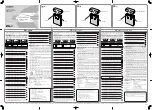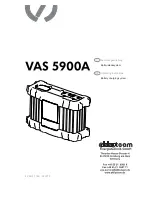
• 7 •
CHARGING A BATTERY OUTSIDE OF THE VEHICLE
1. Place battery in a well-ventilated area.
2. Clean the battery terminals.
3. Connect the battery, following the precautions listed in sections 6 and 7.
4. Connect the charger to a live grounded 120V AC outlet.
5. The green Power LED will light.
6. When charging is complete, disconnect the charger from the AC power, disconnect the negative
clamp, and finally the positive clamp.
7. A marine (boat) battery must be removed and charged on shore.
USING THE QUICK-CONNECT CABLE CONNECTORS
Connect either of the two (2) output cable leads to the charger. Make sure to place the charger on a dry,
non-flammable surface.
WARNING: Never connect the clamp and ring terminal connectors together for use in other
applications, such as external battery or other power source charging, or to extend the output cable
length, as reverse polarity and/or overcharge conditions will occur.
USING THE 50 AMP BATTERY CLAMPS
1. Connect the end of the charger output cable to the end of the battery cable, quick-connect and clamps.
2. Follow the steps in sections 6 and 7, to connect the output clamps to the battery.
3. Connect the charger to a live 120V AC outlet.
USING THE RING CONNECTORS
1. To permanently attach to a battery, loosen and remove each nut from the bolt at the battery terminal.
2. Connect the red POSITIVE connector ring to the POSITIVE battery terminal.
3. Connect the black NEGATIVE connector ring to the NEGATIVE battery terminal.
4. Replace and tighten the nuts to secure.
5. Connect the cable to the end of the charger output cord.
Take care to keep the wires and plug away from metal and moving parts.
6. Connect the charger to a live grounded 120V AC outlet.
BATTERY CHARGING TIMES
APPLICATION
BATTERY
SIZE
CHARGING TIME (Hours)
2A 6A 8A 10A
POWERSPORTS
6Ah
6
32Ah
15
AUTOMOTIVE
300 CCA
12
1000 CCA
30
MARINE
50Ah
15
105Ah
33
2
5
4
10
5
11
1.75
4.5
3.5
8.5
4.25
9.5
1.5
4
3
7
3.5
8
Times are based on a 50% discharged battery and may change,
depending on age and condition of battery.
ENGLISH








































